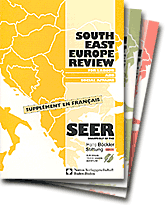From equality without democracy to democracy without equality? Women and transition in southeast Europe
From equality without democracy to democracy without equality? Women and transition in southeast Europe
Author(s): Ulf BrunnbauerSubject(s): Gender Studies
Published by: Nomos Verlag
Summary/Abstract: More than ten years after the beginning of transition, the balance sheet of the transformation of communist societies and centrally-planned economies into liberal democracies and capitalist market economies is still disputed. Some scholars put the emphasis on the increase in political liberties and hail the prospects of economic growth stimulated by privatisation and restructuring, while others focus on the enormous social costs of economic restructuring. But there are some points on which most observers agree, despite their different political backgrounds. One of these is that women as a group belong to the losers in the transition, as regards their social and economic status as well as political representation. In 1994, the American sociologist Gail Kligman summarised the post-89 developments concerning women as: A sharp drop in political participation of women in the public spheres of governance, an increasing feminization of poverty and of refugee populations, pronounced changes in reproductive policies, and a renewed emphasis on the role and responsibility of women as reproducers of cultural identity. Even during the second half of the nineties when, in some transition countries, the political and economic changes have been increasingly consolidated, the plight of women has not fundamentally improved. In this article, I trace some of the paramount aspects of increased discrimination against women caused by the process of transformation in south-east European postcommunist countries (leaving Hungary and Moldavia out of the account). I relate those current developments to the communist legacy as well as to the inherent logic of capitalist restructuring. This allows us to unravel the seemingly paradoxical situation that traditional gender roles are reinforced by a process that should, allegedly, lead to a more modern society.
Journal: SEER - South-East Europe Review for Labour and Social Affairs
- Issue Year: 2000
- Issue No: 03
- Page Range: 151-168
- Page Count: 18
- Language: English

